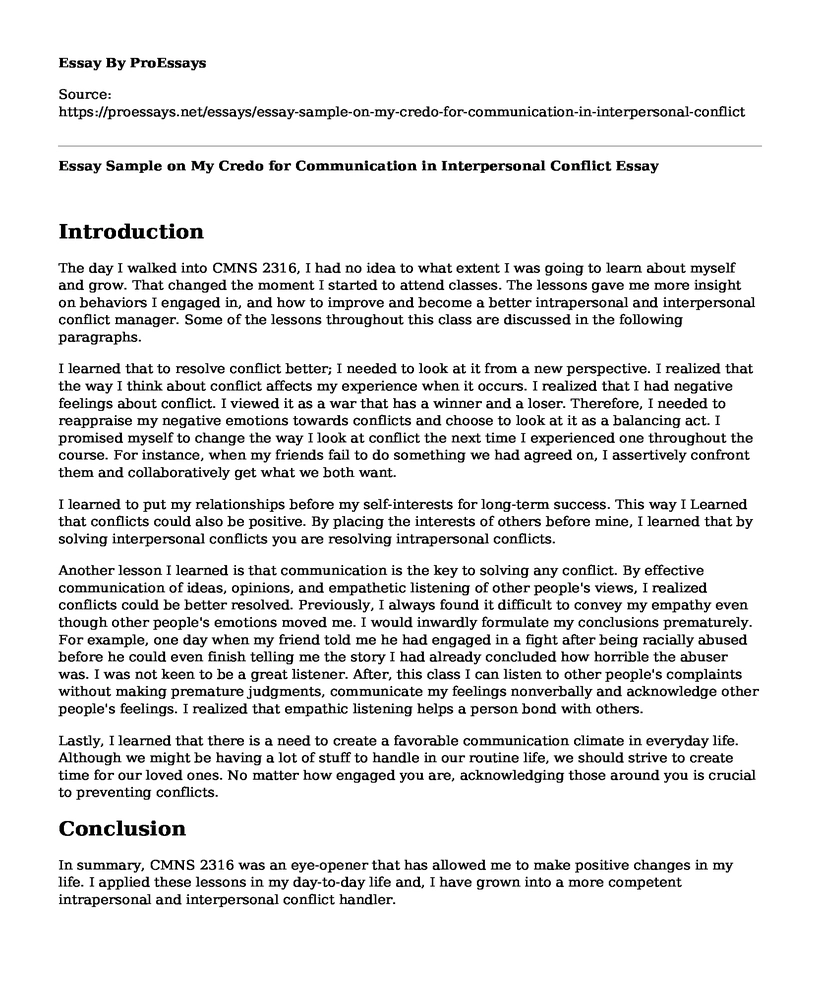Introduction
The day I walked into CMNS 2316, I had no idea to what extent I was going to learn about myself and grow. That changed the moment I started to attend classes. The lessons gave me more insight on behaviors I engaged in, and how to improve and become a better intrapersonal and interpersonal conflict manager. Some of the lessons throughout this class are discussed in the following paragraphs.
I learned that to resolve conflict better; I needed to look at it from a new perspective. I realized that the way I think about conflict affects my experience when it occurs. I realized that I had negative feelings about conflict. I viewed it as a war that has a winner and a loser. Therefore, I needed to reappraise my negative emotions towards conflicts and choose to look at it as a balancing act. I promised myself to change the way I look at conflict the next time I experienced one throughout the course. For instance, when my friends fail to do something we had agreed on, I assertively confront them and collaboratively get what we both want.
I learned to put my relationships before my self-interests for long-term success. This way I Learned that conflicts could also be positive. By placing the interests of others before mine, I learned that by solving interpersonal conflicts you are resolving intrapersonal conflicts.
Another lesson I learned is that communication is the key to solving any conflict. By effective communication of ideas, opinions, and empathetic listening of other people's views, I realized conflicts could be better resolved. Previously, I always found it difficult to convey my empathy even though other people's emotions moved me. I would inwardly formulate my conclusions prematurely. For example, one day when my friend told me he had engaged in a fight after being racially abused before he could even finish telling me the story I had already concluded how horrible the abuser was. I was not keen to be a great listener. After, this class I can listen to other people's complaints without making premature judgments, communicate my feelings nonverbally and acknowledge other people's feelings. I realized that empathic listening helps a person bond with others.
Lastly, I learned that there is a need to create a favorable communication climate in everyday life. Although we might be having a lot of stuff to handle in our routine life, we should strive to create time for our loved ones. No matter how engaged you are, acknowledging those around you is crucial to preventing conflicts.
Conclusion
In summary, CMNS 2316 was an eye-opener that has allowed me to make positive changes in my life. I applied these lessons in my day-to-day life and, I have grown into a more competent intrapersonal and interpersonal conflict handler.Brainstorming
- My belief like IP Conflict:
- Interpersonal conflict occurs when there is a disagreement between two people or groups in a relationship that involves significant dissatisfaction and bitterness.
- My motivation in conflict
- I always strive to find a balance in the disagreement between conflicting parties.
- Qualities of communication I strive for when in IPC
- First, I aim for a favorable communication climate that gives room for a resolution. Second, I look for empathic listening where I don't make a premature conclusion, communicating my feeling nonverbally and acknowledging the feelings of others.
- Conflict climates I seek to promote or avoid
- I strive to encourage a positive communication climate paying attention to every party equally. I avoid taking sides.
- How I aim to treat important others when in conflict with them
- I aim at putting their interests before mine and try to solve our differences collaboratively.
- Kinds of freedom I endorse for myself and others when communicating in conflict
- I look for freedom of expression of ideas and opinions with equality and cooperation.
- Kinds of interpersonal conflict communication I condemn
- I condemn partial or premature judgment during conflict resolution.
- Responsibilities I am willing to assume for the process of working through conflict
- I am eager to be supportive of the needs of each within conflicting parties and not blame anyone or their personalities for the problem.
- Responsibilities I am willing to assume for conflict outcomes, short and long term
- I am willing to be a role model in my day-to-day life; setting an example for others to follow.
- Compose your credo
- Conflicts are inevitable. However, how I solve a conflict says much about my personalities and how I value my relationships. Usually, I never wish for it to occur, but if it does, I want to be a role model in handling it. If I am involved in one, I put the interest of others before mine. If it happens to other people, I am always motivated to find a balance between disagreeing parties by creating a favorable climate for communication where there is equality. I strive to support the needs of conflicting parties and focusing on the issue and not personalities of the conflicting parties. I empathically listen to their needs equally without taking sides or making a premature judgment. For long-term success, I advocate for putting the interests of our relationships before ours.
Cite this page
Essay Sample on My Credo for Communication in Interpersonal Conflict. (2022, Mar 13). Retrieved from https://proessays.net/essays/essay-sample-on-my-credo-for-communication-in-interpersonal-conflict
If you are the original author of this essay and no longer wish to have it published on the ProEssays website, please click below to request its removal:
- Culture, Equity, Power, and Influence in Education Essay
- Essay on Universal Design for Learning: An Inclusive Approach to Education
- Essay Example on Inclusive Education: Philosophy of Exceptional Learning
- Argumentative Essay: Should Children Be Taught Sex Education in Schools?
- Essay Example on Born Ready for Connection: The Still Face Experiment
- Barriers to Student Play: Impact on Performance and Stress - Essay Sample
- Free Essay on The Other Steve Harvey







